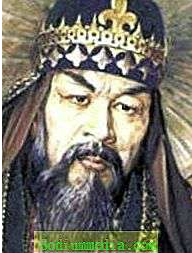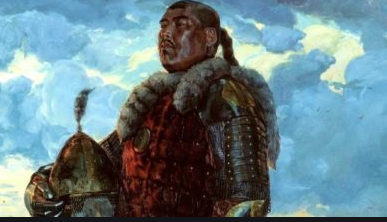The nomad (A short story that turned out pretty long) Part 2
Hi Friends,
In the first part of the story, I explained the genesis of how and why the story was written. You can read about in Part 1 here
The story discusses one of the key events of Russian history of the 14th century. Just to remind you, that at the beginning of the thirteen's century, among many other countries, Russia was conquered by the armies of Genghis khan. After his death, Russia became part of what was called ulus Jochi - the huge territory given to Genghis khan's older son Jochi. Ulus Jochi was also called the Golden Horse.
Russia was a Mongolian dominion until 1480. But a hundred years before that Russian army of Moscow duke Dmitry, the first time in history defeated the Mongolian army in the Battle at Kulikov Field. The leader of Mongols in that great battle was khan Mamai, which will be the subject of scrutiny below.
Part 2



|
Berdi Beg was Khan of the Golden Horde from 1357 till 1359, succeeding his father Jani Beg of whom Berdi Beg may have been behind the poisoning. His reign was marked by turmoil and political murders, and in 1359 he was assassinated by his brother Qulpa, after which the Golden Horde fell apart. |


|
Mamai, of Kiyat descent, was a powerful military commander of the Golden Horde. Contrary to popular misconception, he was not a khan, but a warlord and a kingmaker for several khans, and the de facto regent of the Horde in the 1370s. |
Apparently, he was a smart and fortunate man and was able to move through the ranks in the Golden Horde, especially since eventually he was able to marry the daughter of Khan Berdi Beg. Taking advantage of such a good fortune, he began to place young (Genghizides) khans on Golden Horde throne at his discretion. As the Russian chronicles wrote, "He placed Tsars by his hand."
What was it for Russia? What did the Horde bring to Russia? First, she brought countless suffering during Khan Batu's (Genghis Khan’s grandson) raids and infamous punitive raids.
On the other hand, any negative phenomenon contains its denial. The Mongolian Empire brought a semblance of order to feudal fractured Russia. There were no more such quarrels that were on Russia in 12 and the first third of 13 centuries. The highest arbiter overseeing the Russian relationship now was a khan of the Golden Horde. Whatever internal disagreements happened among the Russian aristocracy they still had to go to the Horde to obtain paisa for the dukedom.
The horde eliminated the chaotic threat that Russian experienced from the steppe, starting from the beginning of the tenth century. The threat of the Horde was so significant to Russia that every separate principality could not resist it. Therefore the Russian dukes had to be “friends” with the Horde, and that friendship eliminated for the Russians all other threat from the steppe.
It was the whole different matter if someone refused to pay domestic state tax to the Horde. Such disobedience ended up with the punitive raids and Russia was made to remember the most turbulent and horrible years of Khan Batu. So they tried to live in peace with the Horde.
That is, it was necessary to pay for the absence of a constant threat. The nomadic steppe has always been a constant threat. First, there were Khazars, then Pechenegs, then Cumans. In those days, a horde of a thousand swards could pass through the transparent medieval border, and from Ryazan to Smolensk could slaughter everything on its way that could be slaughtered and take thousands of captives to Crimea to be sold to slavery. And there was little that anyone could do about it.
On the other hand, the Russian dukes themselves regularly cited Cumans as a hired military force, and everything ended up with rivers of blood. The Horde stopped all this for a while. And that was certainly good. Because it gave a unique chance for the Russian dukedoms and Moscow used this unique opportunity.


|
Ivan Kalita (purse with money). 21 November 1325 – 31 March 1340 Ivan inherited the Principality of Moscow. Ivan participated in the struggle to get the title of Grand Duke of Vladimir, which could be obtained with the approval of a khan of the Golden Horde. |
And by the middle of the 14 century, Moscow became one of the most powerful dukedoms in Russia in the sense of internal order, well-being, and importance. And since for a medieval man, religion was one of the determining factors, a marker of self-identification, Moscow is also made efforts in becoming the religious center of Russia. Metropolitan Alexey of Kiev leaves for Moscow and begins the efforts for the unification of the church around Moscow. The Kiev’s metropolitan area at that time was claimed by Lithuanian people.
